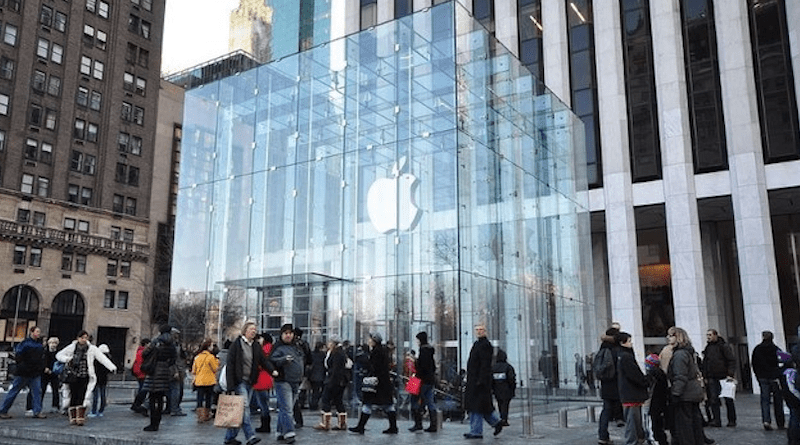Cube-Shaped Conspiracies Won’t Stop Saudi Reforms – OpEd
By Arab News
By Faisal J. Abbas*
In July 2006, a very distressing story in Arabic was being shared across what was then known as the Electronic Muntadayat (Arabic for “web forums,” the ancestor of modern social media).
The story went as follows: Someone is deliberately mocking Islam by building another Kaaba in New York, only the cube-shaped building will not be for God-fearing worshippers, but a 24/7 nightclub which — according to the poorly translated stories — would be “Makkah” for New York visitors.
Of course, it was down to me as a young reporter at Asharq Al-Awsat, our sister publication, to get to the bottom of this story. It soon became clear that the building was neither a nightclub nor a replica of the Kaaba. It was, however, the iconic cube-shaped flagship Apple store on New York’s 5th Avenue.
The shop’s entrance, as it later became clear, is made of glass. But because earlier images showed the glass sides of the cube-shaped shop covered with a protective black layer had resulted in the absolutely false story spreading like wildfire, due to the color resemblance to the actual Kaaba.
Needless to say, at that time — only a few years after 9/11 — emotions ran high and religious extremists issued horrendous fatwas against the West every day. These kinds of fake news stories were often used to fit the agenda, and incite hatred against the West.
Seventeen years later, it is amazing to see that while technology and our ability to access information has advanced by leaps and bounds, such incitement and such extremist ideas persist. Indeed, those who followed any of the social media reaction to the recent announcement by the Saudi Public Investment Fund of a new downtown area in Riyadh will have noticed the similarities.
In particular, it was “The Mukaab” — a huge cube-shaped structure at the heart of the new development — that raised eyebrows and set Twitter on fire. According to some extremists and conspiracy theorists, the cube being built in the heart of the Saudi capital bears too great a resemblance to the Kaaba. Furthermore, it was secretly designed to overshadow the prominence of Islam’s holiest shrine in nearby Makkah by offering a much bigger cube building, purpose-made for entertainment, dining and commerce.
Now, there is surely no need for me to unpack how ridiculous such claims are. First of all, Islam does not hold a monopoly on cube-shaped items. In fact, I am quite sure the creators of Star Trek were not exactly thinking of Makkah when they designed the Borg Cube, nor was Hungarian inventor Erno Rubik when he created his famous 3-D puzzle. Secondly, and more importantly, to even think that such an intention was the inspiration for the design of this landmark is ludicrous in the extreme.
Saudi Arabia, whose king’s official title is Custodian of the Two Holy Mosques, needs no testimony nor acknowledgement from social media trolls when it comes to its commitment to serving this great religion. The Kingdom’s enormous efforts in serving millions of pilgrims, building and restoring mosques in addition to the billions spent on humanitarian aid to Muslim countries, speak for themselves.
At the same time, there is a fascinating plot twist when you compare the two stories — the Apple store versus The Mukaab. In the second, the land of this alleged diabolical plot is no longer “the infidel” United States of America, but the Kingdom which is the cradle of Islam.
The reasons for these allegations are of course an attempt to discredit, and shed doubt upon, the massive and impressive reforms Crown Prince Mohammed bin Salman has brought into being. The truth remains that extremists in Saudi Arabia and beyond are unwilling to accept the fact that women can drive, that they have been liberated from the previous guardianship laws and that they now serve as ambassadors, lawyers and doctors. These extremists want a Taliban-like Saudi Arabia, where women are oppressed, forbidden both education and employment, and exist only as second-class citizens who must remain for the most part at home.
The extremists do not want music or concerts, and they seem to forget that Prophet Muhammad himself, peace be upon him, was greeted with singing and drums when he went on the Hijra from Makkah to Madinah. The extremists do not even want a foreign name such as “Downtown” to be given to the new project, using the name as an excuse for railing against what is alleged “creeping Westernization.”
As petty as this is, the extremists seem to forget that many “Western ideas” have their origins in Arabic. Take the word “algorithm,” for example. It actually originates from the name “Al-Khwarizmi.” He was a scientist who is responsible for influential works in mathematics, astronomy, and geography. He served as the astronomer and chief librarian of the famed House of Wisdom in Abbasid Baghdad. Can you imagine the state of the world had the West been so blind as to forbid their scientists from studying and benefiting from Arab research and Arab knowledge? For sure, these petty people would not be able to use social media — which they have whole-heartedly embraced — without an algorithm.
What the Kingdom ought to do is carry on with its reforms, with progressive changes and ambitious development projects. After all, the biggest threat to Islam is not a closed, cube-shaped building. A far more dangerous threat is a closed mind that refuses to acknowledge that Islam only achieved its golden age when it was inclusive of all cultures, and encouraged research, philosophy, and architecture — all of which it used and transmitted to the West.
- Faisal J. Abbas is the editor-in-chief of Arab News. Twitter: @FaisalJAbbas

